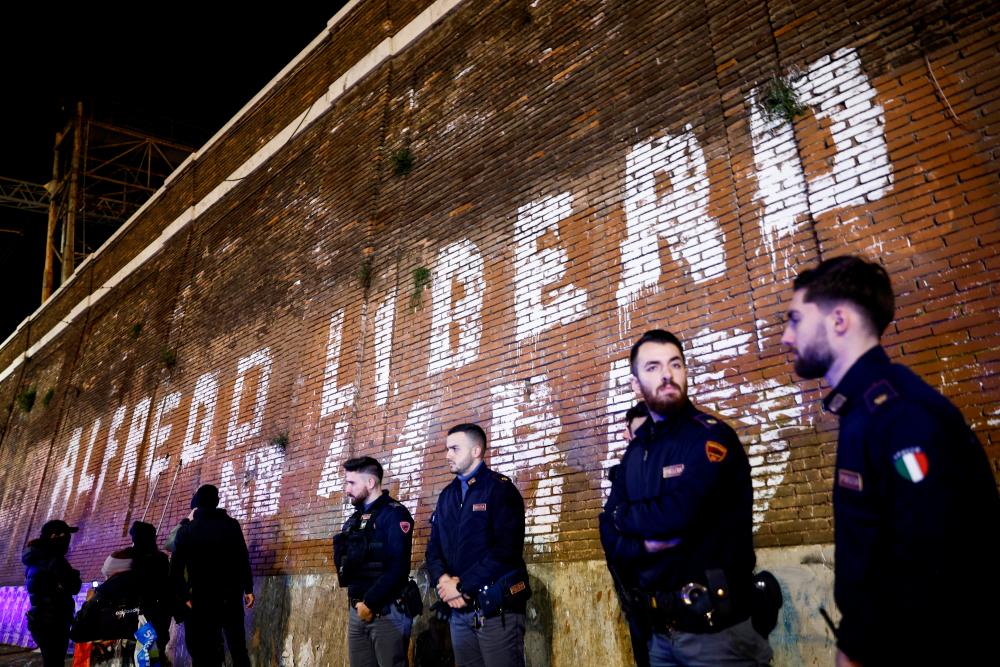ROME: The failing health of an incarcerated anarchist has rekindled debate in Italy over hard prison time usually reserved for mafia bosses, with the new right-wing government vowing not to cave in.
Around 730 people behind bars in Italy are subject to the country’s highly restrictive detention regime known as “41-bis” -- among them anarchist Alfredo Cospito, 55.
Cospito, sentenced to a total of three decades in jail for two separate attacks, has been on a hunger strike for more than 100 days at a prison in Sardinia to protest his 41-bis.
Amnesty International is among those concerned by his fate, while supporters say his treatment, which includes near-total isolation and severe restrictions on family visits, amounts to torture.
His worsening health has triggered outrage among anarchists across Europe, with last weekend alone seeing Italy's consulate in Barcelona vandalised, a diplomat's car in Berlin set ablaze and a molotov cocktail hurled at a Rome police station.
On Tuesday, Prime Minister Giorgia Meloni's government called a press conference to announce that Cospito's 41-bis status would not be revoked, but said the prisoner had been transferred to a Milan prison with an on-site health clinic.
“It is unthinkable for the state to give in,“ said Justice Minister Carlo Nordio, saying the wave of violence in support of Cospito further justified the 41-bis.
Isolation, few visits
First created as an emergency measure amid mafia bombings in the 1980s and 90s, Article 41-bis of the penal code has become a key weapon in the state's arsenal against organised crime.
It can also be applied to other violent crimes and terrorism.
“In Western and Northern Europe this regime is the strictest for dangerous and organised criminals,“ Anna Sergi, a professor of criminology at the University of Essex, told AFP.
Restrictions include isolation in single cells away from the main prison population, limited yard time in small groups, and one short monthly visit with family members, separated by a glass wall.
Books and newspapers sent from outside prison are prohibited.
In cutting off prisoners' communication with the outside, the goal is to stop mafia bosses from running their organisations from behind bars.
It also aims to convince them to turn state's witness -- only by collaborating with authorities can inmates be put under a less harsh regime.
Despite campaigns to abolish it, many in Italy “associate this regime with mafiosi, and there is a strong feeling that mafiosi deserve it no matter what”, said Sergi.
But it remains controversial.
In 2019, the Council of Europe’s anti-torture committee said the restrictions “pose a threat to the subtle balance between the fight against organised crime and the preservation of a tenuous sense of the concept of rehabilitation”.
Both the European Court of Human Rights and Italy's Constitutional Court have upheld 41-bis but called for modifications, such as prohibiting the censorship of inmate-lawyer correspondence and allowing inmates to cook in their cells.
Risk of death
Matteo Messina Denaro, the Cosa Nostra boss arrested on January 16 in Sicily after 30 years on the run, is among those placed under 41-bis.
But prisoner rights group Antigone says the decision to apply the regime to Cospito is “an exaggeration”.
He was put under 41-bis last May, for four years, after being found to have maintained contacts with anarchists from jail.
Judged to be the leader of Italy's Informal Anarchist Federation, Cospito was sentenced in 2014 to nearly 11 years in prison for shooting in the knee the chief executive of a nuclear power company two years earlier.
He was later handed a separate 20-year sentence for setting two homemade bombs outside a police barracks in 2006, a crime the courts deemed terrorist in nature.
In a front-page editorial Monday, La Stampa daily acknowledged the government did not want to bow to threats by Cospito's supporters to amend his status.
But it said the state should not “wash its hands”, warning that the prisoner could die while Italy’s courts weigh the issue.
In December, a Rome court rejected an appeal by Cospito's lawyers to remove him from 41-bis, citing his deteriorating health. A new appeal is now before the Supreme Court, with a hearing set for March 7.
Four people have died in Italian prisons after hunger strikes since 2009, according to local media reports. - AFP














